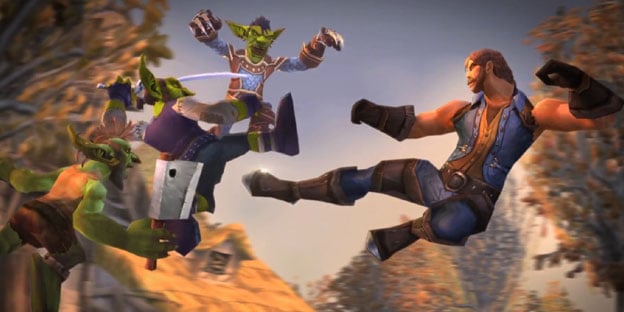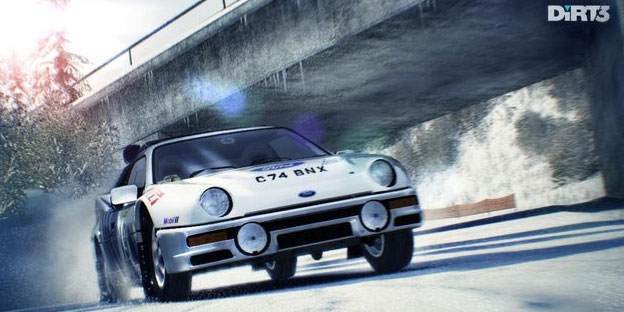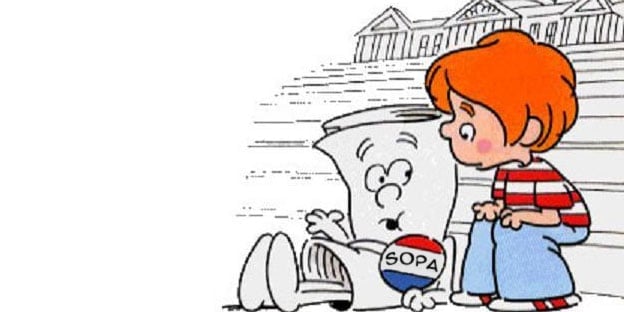SOPA And You: Caring About Intellectual Property Regulation
You’ve probably been hearing a lot about this “SOPA” thing of late; it’s cracked the news with reports that Anonymous hates it and wants its corporate supporters to feel the brunt of their hacking muscle. Of course, this is alongside more measured outcry from netizens who declaim it as the first step down a slippery slope that can only lead to the abolition of our First Amendment right to free speech and the undermining of the entire Internet. Why is a single act of law held to be so dramatic and, more directly, how does this affect you as a gamer?
First of all, SOPA is the Stop Online Piracy Act. As its name implies, its intent is to erect a framework by which individuals and corporations who are producing intellectual property—whether music, video, prose, or games—are able to better defend that property against abuse, dubbed “infringement,” by unscrupulous outsiders. In concept, at least, it’s not an abhorrent idea: rare is the reasonable individual who holds that piracy or other forms of outright intellectual property theft should be legal. SOPA’s controversial nature comes from the degree of power it provides to intellectual property holders with regard to protecting their creations.
This extends well beyond the basic idea of “don’t distribute the fruits of my labor.” It creates a toolset by which intellectual property holders are granted almost absolute control of how their IP is used across the net. As an example, let’s say you wanted to post a video of a new Skyrim glitch that you figured the community would enjoy. Maybe you found an NPC who traverses the land exclusively killing bears by punching them with his bare hands, and he happens to vaguely resemble Chuck Norris. You capture video of the character, edit it down, post it online to your blog, and let it sit overnight, only to find the following day that your blog has been blocked in the United States.

When you try to find out why, you discover that Bethesda made a claim against your website that you were using their intellectual property (footage from their game, in this case) in a manner that they don’t allow. Perhaps you have your blog tied up to Google AdSense and Bethesda doesn’t like that video from one of their games is helping you make money. At this point, if you want to get your website unblocked, you have to file a counter-claim and then the whole mess can end up in court. And, most frightening of all, the content doesn’t have to be even that direct.
Everything from video reviews to sharing screenshots, even the writing of an unofficial guide to a game, is suddenly under tremendous scrutiny, since any and all of these things can, with the language in SOPA, fall victim to overzealous intellectual property police—those actively seeking out and targeting even those instances that would typically fall under “fair use.”
Further, the DNS blocking for which SOPA allows also provides recourse for IP holders against foreign websites. Typically, the United States’ legal system has no control over a foreign entity’s content. With DNS blocking, however, those in the United States can simply use the middle-man, requiring U.S. Internet service providers to block access to specified foreign sites. In other words, it provides intellectual property holders in the United States with a direct means by which to censor the content people within its borders experience.
The biggest victims of this massive blame game, though, end up being the individuals who are currently following the rules, who maybe enjoy making or watching the occasional “Let’s Play” video or sharing captioned screenshots from their favorite games. These aren’t the pirates who are torrenting the hottest new releases, distributing them across file-sharing sites. These are anything from sites that run gaming commentary with screenshots to charity groups, playing live-streamed gaming marathons to raise money for altruistic causes (Pink Lancers Fight Cancer is just one example).
They’re victims not because they will be targeted—as most of these examples are, if not endorsed, silently accepted by the companies that make games (and can even provide increased exposure for their titles)—but because the fear of stepping on an IP holder’s toes persists. Already, the idea of “fair use” as regards licensed content is a nebulous and unwieldy beast. Nonprofit parody videos have been pulled from YouTube due to copyright claims by IP holders and, while these are usually reinstated, the fear that user-produced content could lead to one’s entire website being blocked in the United States is a compelling one, and liable to lead to a tremendous tightening of content regulation on sites such as YouTube and Reddit, which subsist on user-generated content.

For a gamer, that means the community that we have come to expect, that has grown out of the experiences we’ve shared through the ever-present arm of social media, is in danger of being snuffed out, of imploding. That said, the bill is not set in stone, the debate set to continue when Congress resumes session after its winter recess. Further, it appears that large companies, such as Nintendo, EA, and Sony, which had initially expressed their support for SOPA, have removed their names from the list of the bill’s formal supporters.
That said, if you have even the slightest desire to get involved, it is strongly recommended that you proceed to AmericanCensorship.org , which provides a complete breakdown of SOPA and a terrific repository of information on how to contact your congresspeople to let them know your personal feelings on the bill. Remember that, in the end, the government exists to serve the public, not the other way around.
By Shelby Reiches
CCC Contributing Writer
*The views expressed within this article are solely the opinion of the author and do not express the views held by Cheat Code Central.*
